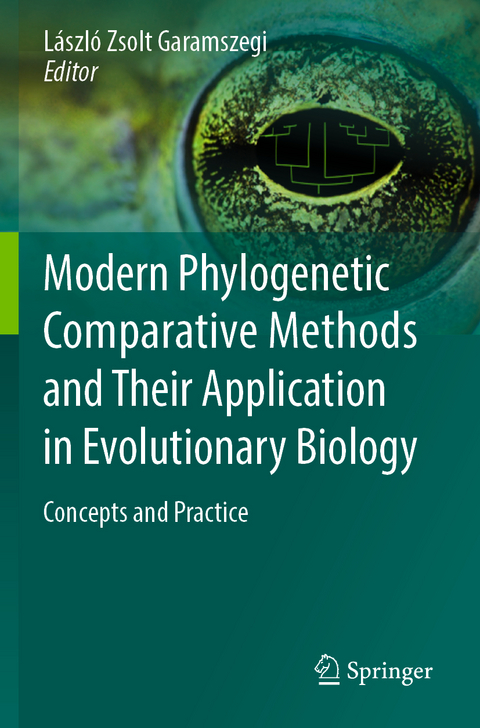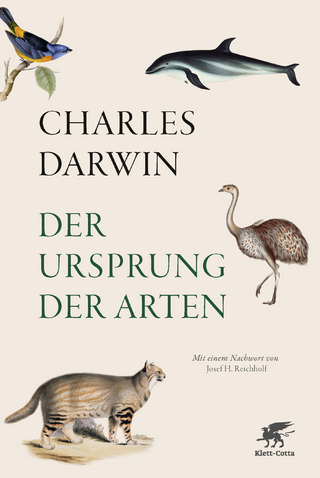
Modern Phylogenetic Comparative Methods and Their Application in Evolutionary Biology
Springer Berlin (Verlag)
978-3-662-51291-3 (ISBN)
Phylogenetic comparative approaches are powerful analytical tools for making evolutionary inferences from interspecific data and phylogenies. The phylogenetic toolkit available to evolutionary biologists is currently growing at an incredible speed, but most methodological papers are published in the specialized statistical literature and many are incomprehensible for the user community. This textbook provides an overview of several newly developed phylogenetic comparative methods that allow to investigate a broad array of questions on how phenotypic characters evolve along the branches of phylogeny and how such mechanisms shape complex animal communities and interspecific interactions. The individual chapters were written by the leading experts in the field and using a language that is accessible for practicing evolutionary biologists. The authors carefully explain the philosophy behind different methodologies and provide pointers - mostly using a dynamically developing online interface - on how these methods can be implemented in practice. These "conceptual" and "practical" materials are essential for expanding the qualification of both students and scientists, but also offer a valuable resource for educators. Another value of the book are the accompanying online resources (available at: http://www.mpcm-evolution.com), where the authors post and permanently update practical materials to help embed methods into practice.
László Zsolt Garamszegi is an Associate Professor at Estación Biológica de Doñana in Seville, Spain. His research focuses on various questions in evolutionary biology, with major interests in the evolution of behaviours, sexual signals and animal communication as well as host-parasite interactions. In all of these lines of investigations, Dr. Garamszegi heavily relies on the application and development of statistical approaches, in which he has obtained a considerable expertise. As a result, he plays a leading role in the dissemination of various tools for data analysis within the disciplines of evolutionary biology and behavioural ecology, which is clearly indicated by the number of methodological papers, journal volumes and conferences to which he contributed.
Part I: Introduction.- An Introduction to the Phylogenetic Comparative Method.- Working with the Tree of Life in Comparative Studies: How to Build and Tailor Phylogenies to Interspecific Datasets.- An Introduction to Supertree Construction (and Partitioned Phylogenetic Analyses) with a View toward the Distinction between Gene Trees and Species Trees.- Graphical Methods for Visualizing Comparative Data on Phylogenies.- A Primer on Phylogenetic Generalised Least Squares.- Statistical Issues and Assumptions of Phylogenetic Generalised Least Squares.- Part II: Handling Phylogenies in Different Statistical Designs.- Uncertainties due to Within-Species Variation in Comparative Studies: Measurement Errors and Statistical Weights.- An Introduction to Phylogenetic Path Analysis.- Phylogenetic Logistic Regression for Binary Dependent Variables.- Keeping Yourself Updated: Bayesian Approaches in Phylogenetic Comparative Methods with a focus on Markov-chain models of Discrete Character Evolution.-General Quantitative Genetic Methods for Comparative Biology.- Multimodel-Inference in Comparative Analyses.- Part III: Specific Models for Studying Evolutionary Mechanisms.- Simulation of Phylogenetic Data.- Use and Misuse of Comparative Methods in the Study of Adaptation.- Modelling Stabilising Selection: the Attraction of Ornstein-Uhlenbeck Models.- Hidden Markov Models for Studying the Evolution of Binary Morphological Characters.- Detecting Phenotypic Selection by Approximate Bayesian Computation (ABC) in Phylogenetic Comparative Methods.- Phylogenetic Comparative Methods for Studying Clade-Wide Convergence.- Metrics and Models of Community Phylogenetics.- Event-Based Cophylogenetic Comparative Analysis.- Phylogenetic Prediction to Identify "Evolutionary Singularities".- Preparing Paleontological Datasets for Phylogenetic Comparative Methods.
From the book reviews:
"Phylogenetics is the study of evolutionary relationships among species or groups of species. ... phylogenetic comparative method refers to analyses in a historical framework that compares data across such groups of species controlling for relatedness. Authors in this textbookreference work for scholars and students introduce and explain the mostly statistical methods for undertaking these comparisons. ... A website provides data sets and guides to analyzing them with the approaches discussed in some chapters. Summing Up: Recommended. Graduate students through researchers/faculty." (E. Delson, Choice, Vol. 52 (6), February, 2015)| Erscheinungsdatum | 03.08.2016 |
|---|---|
| Zusatzinfo | XVI, 552 p. 113 illus., 47 illus. in color. |
| Verlagsort | Berlin |
| Sprache | englisch |
| Maße | 155 x 235 mm |
| Themenwelt | Naturwissenschaften ► Biologie ► Evolution |
| Schlagworte | Bayesian Approaches • biodiversity • Biomedical and Life Sciences • Brownian motion • Ecology • Evolution • evolutionary biology • Life Sciences, general • molecular ecology • phylogenetic comparative methods • Phylogenetic Least Square Models • Statistics • Theoretical Ecology/Statistics |
| ISBN-10 | 3-662-51291-2 / 3662512912 |
| ISBN-13 | 978-3-662-51291-3 / 9783662512913 |
| Zustand | Neuware |
| Haben Sie eine Frage zum Produkt? |
aus dem Bereich


